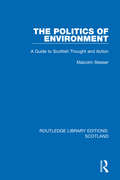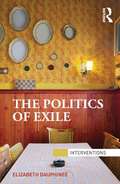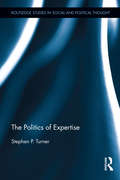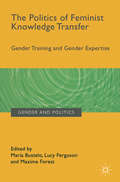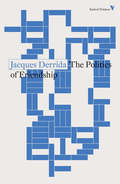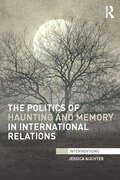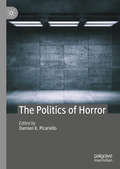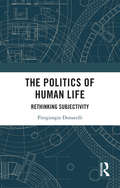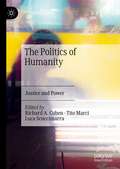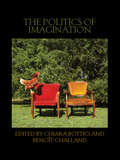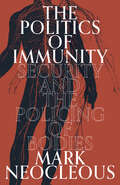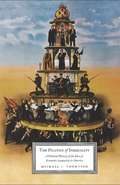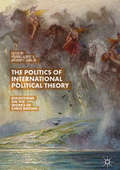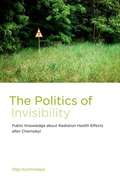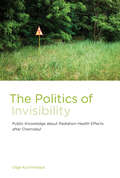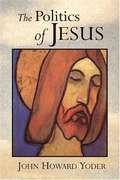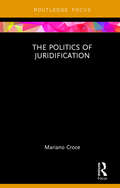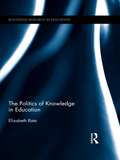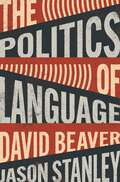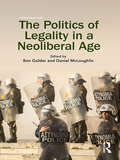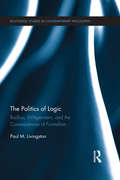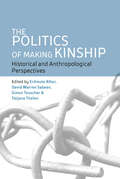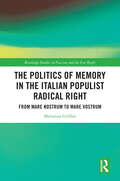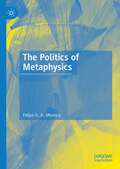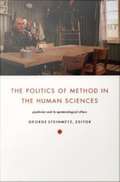- Table View
- List View
The Politics of Environment: A Guide to Scottish Thought and Action (Routledge Library Editions: Scotland #28)
by Malcolm SlesserOriginally published in 1972 and ahead of its time in many respects this book was the first to take a constructive approach to the problems facing the human race in the 20th Century. It remains enduringly relevant today and discusses over-population, under-employment, atmospheric pollution, exhaustion of global resources and geo-politics. It shows how all these issues are inter-connected and therefore how conventional attempts to solve some of them merely exacerbate others. It asserts that the solution rests in the evolution of a realistic form of politics which puts the community first.
The Politics of Exile (Interventions)
by Elizabeth Dauphinee"The most thought-provoking and refreshing work on Bosnia and the former Yugoslavia in a long time.It is certainly an immense contribution to the broadening schools within international relations." Times Higher Education (THE). Written in both autoethnographical and narrative form, The Politics of Exile offers unique insight into the complex encounter of researcher with research subject in the context of the Bosnian War and its aftermath. Exploring themes of personal and civilizational guilt, of displaced and fractured identity, of secrets and subterfuge, of love and alienation, of moral choice and the impossibility of ethics, this work challenges us to recognise pure narrative as an accepted form of writing in international relations. The author brings theory to life and gives corporeal reality to a wide range of concepts in international relations, including an exploration of the ways in which young academics are initiated into a culture where the volume of research production is more valuable than its content, and where success is marked not by intellectual innovation, but by conformity to theoretical expectations in research and teaching. This engaging work will be essential reading for all students and scholars of international relations and global politics.
The Politics of Expertise (Routledge Studies in Social and Political Thought #82)
by Stephen P. TurnerThis book collects case studies and theoretical papers on expertise, focusing on four major themes: legitimation, the aggregation of knowledge, the distribution of knowledge and the distribution of power. It focuses on the institutional means by which the distribution of knowledge and the distribution of power are connected, and how the problems of aggregating knowledge and legitimating it are solved by these structures. The radical novelty of this approach is that it places the traditional discussion of expertise in democracy into a much larger framework of knowledge and power relations, and in addition begins to raise the questions of epistemology that a serious account of these problems requires.
The Politics of Feminist Knowledge Transfer: Gender Training and Gender Expertise (Gender and Politics)
by Maxime Forest Lucy Ferguson Mar�a BusteloThe Politics of Feminist Knowledge Transfer draws together analytical work on gender training and gender expertise. Its chapters critically reflect on the politics of feminist knowledge transfer, understood as an inherently political, dynamic and contested process, the overall aim of which is to transform gendered power relations in pursuit of more equal societies, workplaces, and policies. At its core, the work explores the relationship between gender expertise, gender training, and broader processes of feminist transformation arising from knowledge transfer activities. Examining these in a reflective way, the book brings a primarily practice-based debate into the academic arena. With contributions from authors of diverse backgrounds, including academics, practitioners and representatives of gender training institutions, the editors combine a focus on gender expertise and gender training, with more theory-focused chapters.
The Politics of Friendship (Radical Thinkers Ser. #Vol. 5)
by Jacques Derrida"O, my friends, there is no friend." The most influential of contemporary philosophers explores the idea of friendship and its political consequences, past and future. Until relatively recently, Jacques Derrida was seen by many as nothing more than the high priest of Deconstruction, by turns stimulating and fascinating, yet always somewhat disengaged from the central political questions of our time. Or so it seemed. Derrida&’s &“political turn,&” marked especially by the appearance of Specters of Marx, has surprised some and delighted others. In The Politics of Friendship Derrida renews and enriches this orientation through an examination of the political history of the idea of friendship pursued down the ages. Derrida&’s thoughts are haunted throughout the book by the strange and provocative address attributed to Aristotle, &“my friends, there is no friend&” and its inversions by later philosophers such as Montaigne, Kant, Nietzsche, Schmitt and Blanchot. The exploration allows Derrida to recall and restage the ways in which all the oppositional couples of Western philosophy and political thought—friendship and enmity, private and public life—have become madly and dangerously unstable. At the same time he dissects genealogy itself, the familiar and male-centered notion of fraternity and the virile virtue whose authority has gone unquestioned in our culture of friendship and our models of democracy The future of the political, for Derrida, becomes the future of friends, the invention of a radically new friendship, of a deeper and more inclusive democracy. This remarkable book, his most profoundly important for many years, offers a challenging and inspiring vision of that future.
The Politics of Haunting and Memory in International Relations (Interventions)
by Jessica AuchterInternational Relations has traditionally focused on conflict and war, but the effects of violence including dead bodies and memorialization practices have largely been considered beyond the purview of the field. Drawing on Jacques Derrida’s notion of hauntology to consider the politics of life and death, Auchter traces the story of how life and death and a clear division between the two is summoned in the project of statecraft. She argues that by letting ourselves be haunted, or looking for ghosts, it is possible to trace how statecraft relies on the construction of such a dichotomy. Three empirical cases offer fertile ground for complicating the picture often painted of memorialization: Rwandan genocide memorials, the underexplored case of undocumented immigrants who die crossing the US-Mexico border, and the body/ruins nexus in 9/11 memorialization. Focusing on the role of dead bodies and the construction of particular spaces as the appropriate sites for memory to be situated, it offers an alternative take on the new materialisms movement in international relations by asking after the questions that arise from an ethnographic approach to the subject: viewing things from the perspective of dead bodies, who occupy the shadowy world of post-conflict international politics. This work will be of great interest to students and scholars of critical international relations, security studies, statecraft and memory studies.
The Politics of Horror
by Damien K. PicarielloThe Politics of Horror features contributions from scholars in a variety of fields—political science, English, communication studies, and others—that explore the connections between horror and politics. How might resources drawn from the study of politics inform our readings of, and conversations about, horror? In what ways might horror provide a useful lens through which to consider enduring questions in politics and political thought? And what insights might be drawn from horror as we consider contemporary political issues? In turning to horror, the contributors to this volume offer fresh provocations to inform a broad range of discussions of politics.
The Politics of Human Life: Rethinking Subjectivity
by Piergiorgio DonatelliThis book centres on the notion of human life that lies at the foundation of contemporary thinking in the areas of ethics, law and politics. Centrally, the book addresses the deep divide, characteristic of this thinking, between: on the one hand, those who wish to do away with any anthropological understandings of the human, and appeal to mere facts delivered by science; and, on the other hand, critics who defend an anthropological understanding of human life that is tied to traditional, teleological, metaphysics. In short: knowledge of the world is given over to the sciences and moral theory is considered to operate in a distinct, and insulated, domain. But this opposition has, Piergiorgio Donatelli argues here, outlived its usefulness. Through a discussion of the intimate human spheres of reproduction, dying and sexuality, he argues that we now live in a world characterized by new ways of living: by novel rearrangements of emotions, and by the modification, and in some cases a radical rupture in, existing ideas of human life. These shifts challenge any established separation between facts and norms, between human life and its conceptualization. As such, it is argued here, they simultaneously offer the possibility of a new, socially articulated, understanding of the relationship between subjectivity and normativity. Engaging pressing contemporary themes, this book will be invaluable to scholars in the fields of ethics, law and political theory, and both analytic and continental philosophy.
The Politics of Humanity: Justice and Power
by Richard A. Cohen Tito Marci Luca ScuccimarraThis book is the collaborative response of engaged scholars from diverse countries and disciplines who are disturbed by the contemporary resurgence of anti-democratic movements and regimes throughout the world. These movements have manifest in vitriolic “nationalist” polemics, state-supported violence, and exclusionary anti-immigrant policies, less than a century after the rise and fall and horrific devastations of fascism in the early 20th century.
The Politics of Imagination (Birkbeck Law Press)
by Chiara Bottici Benoît ChallandThe Politics of Imagination offers a multidisciplinary perspective on the contemporary relationship between politics and the imagination. What role does our capacity to form images play in politics? And can we define politics as a struggle for people’s imagination? As a result of the increasingly central place of the media in our lives, the political role of imagination has undergone a massive quantitative and a qualitative change. As such, there has been a revival of interest in the concept of imagination, as the intimate connections between our capacity to form images and politics becomes more and more evident. Bringing together scholars from different disciplines and theoretical outlooks, The Politics of Imagination examines how the power of imagination reverberates in the various ambits of social and political life: in law, history, art, gender, economy, religion and the natural sciences. And it will be of considerable interest to those with contemporary interests in philosophy, political philosophy, political science, legal theory, gender studies, sociology, nationalism, identity studies, cultural studies, and media studies.
The Politics of Immunity: Security and the Policing of Bodies
by Mark NeocleousThe violence and destruction hiding behind the obsession with immunityOur contemporary political condition is obsessed with immunity. The immunity of bodies and the body politic; personal immunity and herd immunity; how to immunize the social system against breakdown. The obsession intensifies with every new crisis and the mobilization of yet more powers of war and police, from quarantine to border closures and from vaccination certificates to immunological surveillance.Engaging four key concepts with enormous cultural weight – Cell, Self, System and Sovereignty – Politics of Immunity moves from philosophical biology to intellectual history and from critical theory to psychoanalysis to expose the politics underpinning the way immunity is imagined. At the heart of this imagination is the way security has come to dominate the whole realm of human experience. From biological cell to political subject, and from physiological system to the social body, immunity folds into security, just as security folds into immunity. The book thus opens into a critique of the violence of security and spells out immunity&’s tendency towards self-destruction and death: immunity, like security, can turn its aggression inwards, into the autoimmune disorder.Wide-ranging and polemical, Politics of Immunity lays down a major challenge to the ways in which the immunity of the self and the social are imagined.
The Politics of Inequality: A Political History of the Idea of Economic Inequality in America
by Michael ThompsonSince the early days of the American republic, political thinkers have maintained that a grossly unequal division of property, wealth, and power would lead to the erosion of democratic life. Yet over the past thirty-five years, neoconservatives and neoliberals alike have redrawn the tenets of American liberalism. Nowhere is this more evident than in our current mainstream political discourse, in which the politics of economic inequality are rarely discussed.In this impassioned book, Michael J. Thompson reaches back into America's rich intellectual history to reclaim the politics of inequality from the distortion of recent American conservatism. He begins by tracing the development of the idea of economic inequality as it has been conceived by political thinkers throughout American history. Then he considers the change in ideas and values that have led to the acceptance and occasional legitimization of economic divisions. Thompson argues that American liberalism has made a profound departure from its original practice of egalitarian critique. It has all but abandoned its antihierarchical and antiaristocratic discourse. Only by resuscitating this tradition can democracy again become meaningful to Americans. The intellectuals who pioneered egalitarian thinking in America believed political and social relations should be free from all forms of domination, servitude, and dependency. They wished to expose the antidemocratic character of economic life under capitalism and hoped to prevent the kind of inequalities that compromise human dignity and freedom-the core principles of early American politics. In their wisdom is a much broader, more compelling view of democratic life and community than we have today, and with this book, Thompson eloquently and adamantly fights to recover this crucial strand of political thought. In this impassioned book, Michael J. Thompson reaches back into America's rich intellectual history to reclaim the politics of inequality from the distortion of recent American conservatism. He begins by tracing the development of the idea of economic inequality as it has been conceived by political thinkers throughout American history. Then he considers the change in ideas and values that have led to the acceptance and occasional legitimization of economic divisions. Thompson argues that American liberalism has made a profound departure from its original practice of egalitarian critique; it has all but abandoned its antihierarchical and antiaristocratic discourse. Only by resuscitating this tradition can democracy again become meaningful to Americans. The intellectuals who pioneered egalitarian thinking in America believed political and social relations should be free from all forms of domination, servitude, and dependency. They wished to expose the antidemocratic character of economic life under capitalism and hoped to prevent the kind of inequalities that compromise human dignity and freedom—the core principles of early American politics. In their wisdom is a much broader, more compelling view of democratic life and community than we have today, and with this book, Thompson eloquently and adamantly fights to recover this crucial strand of political thought.
The Politics of International Political Theory: Reflections On The Works Of Chris Brown
by Mathias Albert Anthony F. Lang Jr.This book assesses the impact of the work of Chris Brown in the field of International Political Theory. The volume engages with general issues of IPT as well as basic issues such as the use and role of practical reasoning and presents a nuanced understanding about issues regarding the legitimacy of war and violence. It explores questions that pertain to human rights, morality, and ethics, and generally an outlook for devising a ‘better’ world. The project is ideal for audiences with interest in International Relations, Ethics and Morality Studies and International Political Theory.
The Politics of Invisibility
by Olga KuchinskayaBefore Fukushima, the most notorious large-scale nuclear accident the world had seenwas Chernobyl in 1986. The fallout from Chernobyl covered vast areas in the Northern Hemisphere,especially in Europe. Belarus, at the time a Soviet republic, suffered heavily: nearly a quarter ofits territory was covered with long-lasting radionuclides. Yet the damage from the massive falloutwas largely imperceptible; contaminated communities looked exactly like noncontaminated ones. Itcould be known only through constructed representations of it. In The Politics ofInvisibility, Olga Kuchinskaya explores how we know what we know about Chernobyl,describing how the consequences of a nuclear accident were made invisible. Her analysis shedsvaluable light on how we deal with other modern hazards -- toxins or global warming -- that arelargely imperceptible to the human senses. Kuchinskaya describes the production ofinvisibility of Chernobyl's consequences in Belarus -- practices that limit public attention toradiation and make its health effects impossible to observe. Just as mitigating radiologicalcontamination requires infrastructural solutions, she argues, the production and propagation ofinvisibility also involves infrastructural efforts, from redefining the scope and nature of theaccident's consequences to reshaping research and protection practices. Kuchinskaya finds vast fluctuations in recognition, tracing varyingly successfulefforts to conceal or reveal Chernobyl's consequences at different levels -- among affectedpopulations, scientists, government, media, and international organizations. The production ofinvisibility, she argues, is a function of power relations.
The Politics of Invisibility: Public Knowledge about Radiation Health Effects after Chernobyl (Infrastructures)
by Olga KuchinskayaLessons from the massive Chernobyl nuclear accident about how we deal with modern hazards that are largely imperceptible.Before Fukushima, the most notorious large-scale nuclear accident the world had seen was Chernobyl in 1986. The fallout from Chernobyl covered vast areas in the Northern Hemisphere, especially in Europe. Belarus, at the time a Soviet republic, suffered heavily: nearly a quarter of its territory was covered with long-lasting radionuclides. Yet the damage from the massive fallout was largely imperceptible; contaminated communities looked exactly like noncontaminated ones. It could be known only through constructed representations of it. In The Politics of Invisibility, Olga Kuchinskaya explores how we know what we know about Chernobyl, describing how the consequences of a nuclear accident were made invisible. Her analysis sheds valuable light on how we deal with other modern hazards—toxins or global warming—that are largely imperceptible to the human senses.Kuchinskaya describes the production of invisibility of Chernobyl's consequences in Belarus—practices that limit public attention to radiation and make its health effects impossible to observe. Just as mitigating radiological contamination requires infrastructural solutions, she argues, the production and propagation of invisibility also involves infrastructural efforts, from redefining the scope and nature of the accident's consequences to reshaping research and protection practices. Kuchinskaya finds vast fluctuations in recognition, tracing varyingly successful efforts to conceal or reveal Chernobyl's consequences at different levels—among affected populations, scientists, government, media, and international organizations. The production of invisibility, she argues, is a function of power relations.
The Politics of Jesus: Vicit Agnus Noster 2nd edition
by John H. YoderUsing the texts of the New Testament, Yoder critically examines the traditional portrait of Jesus as an apolitical figure and attempts to clarify the true impact of Jesus' life, work, and teachings on his disciples' social behavior.
The Politics of Juridification: The Actor's Revenge (Law and Politics)
by Mariano CroceThe Politics of Juridification offers a timely contribution to debates about how politics is being affected by the increasing relevance of judicial bodies to the daily administration of Western political communities. While most critical analyses portray juridification as a depoliticizing, de-democratizing transferral of political authority to the courts (whether national or international), this book centres on the workable ambivalence of such a far-reaching phenomenon. While juridification certainly intensifies the power and competences of judicial bodies to the disadvantage of representative political institutions, it cannot be easily reduced to the demise of democratic politics. By focusing on the multiple ways in which social agents make use of the law, The Politics of Juridification teases out the agential and transformative aspects of the various negotiations social agents engage with legal institutions with a view to obtaining political visibility. In particular, the book homes in on two seemingly distinct phenomena: on one hand, the regulation of sexuality and emerging kinship formations; on the other, the fragmentation of legal settings due to the claims to legal autonomy advanced by sub-state cultural and religious groups. By doing so, the book makes the case for an unexpected convergence between the struggles for legal recognition of sexual minorities and religious and cultural minorities. The conclusion is that juridification does entail normalization and favour the infiltration of law into the social realm. But because of its ambivalent nature, it can and does serve as an alternative vehicle for social change – one that attaches more importance to how social agents produce law on a daily basis and how this law permeates official legal orders.
The Politics of Knowledge in Education (Routledge Research in Education)
by Elizabeth RataThis book explores the decline of the teaching of epistemic, conceptual knowledge in schools, its replacement with everyday social knowledge, and its relation to changes in the division of labor within the global economy. It argues that the emphasis on social knowledge in postmodern and social constructionist pedagogy compounds the problem, and examines the consequences of these changes for educational opportunity and democracy itself.
The Politics of Language
by Jason Stanley David BeaverA provocative case for the inherently political nature of languageIn The Politics of Language, David Beaver and Jason Stanley present a radical new approach to the theory of meaning, offering an account of communication in which political and social identity, affect, and shared practices play as important a role as information. This new view of language, they argue, has dramatic consequences for free speech, democracy, and a range of other areas in which speech plays a central role.Drawing on a wealth of disciplines, The Politics of Language argues that the function of speech—whether in dialogue, larger group interactions, or mass communication—is to attune people to something, be it a shared reality, emotion, or identity. Reconceptualizing the central ideas of pragmatics and semantics, Beaver and Stanley apply their account to a range of phenomena that defy standard frameworks in linguistics and philosophy of language—from dog whistles and covert persuasion to echo chambers and genocidal speech. The authors use their framework to show that speech is inevitably political because all communication is imbued with the resonances of particular ideologies and their normative perspectives on reality.At a time when democracy is under attack, authoritarianism is on the rise, and diversity and equality are being demanded, The Politics of Language offers a powerful new vision of the language of politics, ideology, and protest.
The Politics of Legality in a Neoliberal Age
by Ben Golder Daniel McLoughlinThis volume addresses the relationship between law and neoliberalism. Assembling work from established and emerging legal scholars, political theorists, philosophers, historians, and sociologists from around the world – including the Americas, Australia, Europe, and the United Kingdom – it addresses the conceptual, legal, and political relationships between liberal legality and neoliberal economics. More specifically, the book analyses the role that legality plays in the dominant economic force of our time, offering both a legal corrective to scholarship in economics and political economy that has paid insufficient attention to legal ideas, and, at the same time, a political economic corrective to legal scholarship that has only recently turned to theorizing neoliberalism. It will be of enormous interest to those working at the intersection of law and politics in our neoliberal age.
The Politics of Logic: Badiou, Wittgenstein, and the Consequences of Formalism (Routledge Studies in Contemporary Philosophy)
by Paul LivingstonIn this book, Livingston develops the political implications of formal results obtained over the course of the twentieth century in set theory, metalogic, and computational theory. He argues that the results achieved by thinkers such as Cantor, Russell, Godel, Turing, and Cohen, even when they suggest inherent paradoxes and limitations to the structuring capacities of language or symbolic thought, have far-reaching implications for understanding the nature of political communities and their development and transformation. Alain Badiou's analysis of logical-mathematical structures forms the backbone of his comprehensive and provocative theory of ontology, politics, and the possibilities of radical change. Through interpretive readings of Badiou's work as well as the texts of Giorgio Agamben, Jacques Lacan, Jacques Derrida, Gilles Deleuze, and Ludwig Wittgenstein, Livingston develops a formally based taxonomy of critical positions on the nature and structure of political communities. These readings, along with readings of Parmenides and Plato, show how the formal results can transfigure two interrelated and ancient problems of the One and the Many: the problem of the relationship of a Form or Idea to the many of its participants, and the problem of the relationship of a social whole to its many constituents.
The Politics of Making Kinship: Historical and Anthropological Perspectives
by Tatjana Thelen Erdmute Alber, David Warren Sabean, Simon TeuscherThe long tradition of Western political thought included kinship in models of public order, but the social sciences excised it from theories of the state, public sphere, and democratic order. Kinship has, however, neither completely disappeared from the political cultures of the West nor played the determining social and political role ascribed to it elsewhere. Exploring the issues that arise once the divide between kinship and politics is no longer taken for granted, The Politics of Making Kinship demonstrates how political processes have shaped concepts of kinship over time and, conversely, how political projects have been shaped by specific understandings, idioms and uses of kinship. Taking vantage points from the post-Roman era to early modernity, and from colonial imperialism to the fall of the Berlin Wall and beyond this international set of scholars place kinship centerstage and reintegrate it with political theory.
The Politics of Memory in the Italian Populist Radical Right: From Mare Nostrum to Mare Vostrum (Routledge Studies in Fascism and the Far Right)
by Marianna GriffiniThe Politics of Memory in the Italian Populist Radical Right examines the role of colonial memory in the contemporary Italian populist radical right, which includes the Lega and Fratelli d’Italia (FdI). The book originally adopts postcolonialism as an analytical framework to critically examine which roles colonial memory plays in the Italian populist radical right. Considering the timeframe between 2013 and 2021, this book suggests that the contemporary Italian populist radical right selectively shaped its memory of the colonial past, expunging the most difficult aspects from it. The fact that the Italian populist radical right parties examined do not fully acknowledge the controversial aspects of Italy’s colonial past, which are bracketed off discourse, may contribute to the deployment of colonial discourse by these same parties when discussing immigration. From this Italian case study, broader implications can be drawn regarding the role of colonial memory in political discourse, which is a topical matter across Europe. The book will be of interest to those studying populism, the radical right, Italian politics and history, colonialism, and the politics of memory.
The Politics of Metaphysics
by Felipe G. MoreiraSince immemorial times, persons have been engaged in disputes in metaphysics. This book reacts to this fact by supporting five theses. Thesis 1 is that disputes are micro-wars that have a significant social importance; they involve conflicting parties who may resort to some kind of violence and depend on normative factors. Thesis 2 is that disputes can be approached from right-wing or left-wing stances. Thesis 3 is that the grounds for endorsing an approach to a dispute are problematic starting points that may be rationally rejected. Thesis 4 is that disputes have an incommensurable greatness. Thesis 5 is that right-wing approaches to disputes may be less appealing than the left-wing one championed by the book for those who endorse that one is to avoid expressing “subtle” violence. This is the violence expressed by those who suggest that others who disagree with one’s criteria to deal with disputes fall short of logos or act as if such others did not exist.
The Politics of Method in the Human Sciences: Positivism and Its Epistemological Others
by George SteinmetzThe Politics of Method in the Human Sciences provides a remarkable comparative assessment of the variations of positivism and alternative epistemologies in the contemporary human sciences. Often declared obsolete, positivism is alive and well in a number of the fields; in others, its influence is significantly diminished. The essays in this collection investigate its mutations in form and degree across the social science disciplines. Looking at methodological assumptions field by field, individual essays address anthropology, area studies, economics, history, the philosophy of science, political science and political theory, and sociology. Essayists trace disciplinary developments through the long twentieth century, focusing on the decades since World War II. Contributors explore and contrast some of the major alternatives to positivist epistemologies, including Marxism, psychoanalysis, poststructuralism, narrative theory, and actor-network theory. Almost all the essays are written by well-known practitioners of the fields discussed. Some essayists approach positivism and anti-positivism via close readings of texts influential in their respective disciplines. Some engage in ethnographies of the present-day human sciences; others are more historical in method. All of them critique contemporary social scientific practice. Together, they trace a trajectory of thought and method running from the past through the present and pointing toward possible futures. Contributors. Andrew Abbott, Daniel Breslau, Michael Burawoy, Andrew Collier , Michael Dutton, Geoff Eley, Anthony Elliott, Stephen Engelmann, Sandra Harding, Emily Hauptmann, Webb Keane, Tony Lawson, Sophia Mihic, Philip Mirowski, Timothy Mitchell, William H. Sewell Jr. , Margaret R. Somers, George Steinmetz, Elizabeth Wingrove
